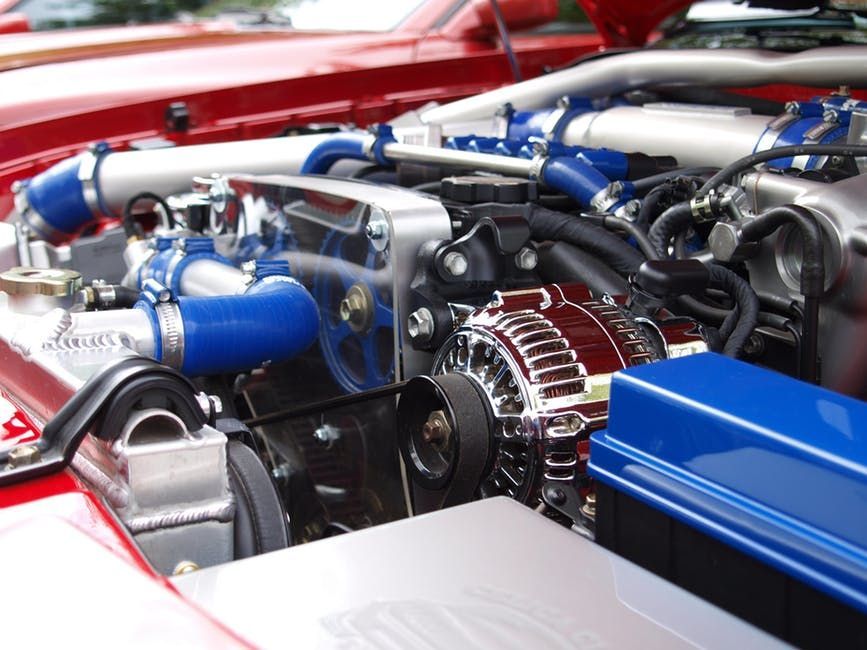Is Your Engine Making a Knocking Noise?

You may have felt that sudden panic when you started your car and it made a strange sound.
Nothing's worse than that feeling of knowing your car needs to be fixed.
It's because you know how much car problems cost. You don't know how expensive or how long it will take to get it fixed.
This is especially true of engine knocking noises in your vehicle. When you hear an engine knocking noise, it could for different reasons that require minimal work to labor-intensive work, which is why it's important to be aware of what causes engine knocking noises.
You might think a worse feeling is not knowing what that knocking sound is in your engine. You don't know how much it's going to cost or if you'll have to replace your engine.
This is why it's essential to know what engine knocking is and what can cause this sound.
If you have no idea what an engine knocking sound is, then reading about it in this post can offer some insight into what this means for your vehicle and what you can do about it.
Here's everything you need to know about engine knocking and why you should never ignore it.
What You Need to Know About Engine Knocking?
Having an understanding of engine knocking can provide some valuable information about your car about what you can possibly do about it if it does happen.
You want to catch these problems immediately before you find yourself buying new or going without a car.
Low Octane
If you hear an engine knock in your vehicle, it could mean you have low octane .
This essentially means that you're putting in the wrong gasoline in your vehicle. Some vehicles require high octane fuel, which means it can withstand more compression before igniting.
In essence, this means that if you put lower octane fuel in your vehicle and it requires higher octane gasoline, you could be damaging your vehicle.
Therefore, if you put in lower octane fuel and your car requires higher octane fuel, it can lead to engine knocking. This is why it's important to look at your vehicle's handbook and see what kind of gasoline it requires.
Don't assume your vehicle takes the cheapest gasoline. You may save some money on gas by opting for lower octane gas, but in the end, you may be spending big when you find there's damage to your engine because you continued to put lower octane fuel in your vehicle.
Bad Knock Sensor
Having a bad knock sensor is almost a best-case scenario if you hear an engine knocking sound.
In many modern vehicles, there's an automatic sensor to detect engine knocks. It can detect air/fuel ratio and fuel injectors. The sensor detects if everything is running smoothly in the ratio and injectors.
However, these sensors can be faulty and can lead to an engine knocking sound.
In addition to knowing what to do if you hear a knocking sound in your engine, you can also find more about what maintenance should be done to your car in our blog.
Being aware of what maintenance to do on your vehicle can help you potentially avoid an engine knock sound.
Worn Bearings
You might also find that your engine knocking sound is from a rod knock. The rod bearings allow for smooth piston movement.
However, when the rod bearings are worn down, the piston can make noise by their rattling against the crankshaft, thereby making an engine knocking noise.
The best way to fix this issue is to install new bearings on your vehicle. You may also need work done on the crankshaft or pistons, depending on where the problem is.
If your vehicle does have worn bearings, it may be labor and time-intensive, which is something to be aware of if you take your vehicle to a mechanic.
Carbon Deposits
Another problem that could be from hearing an engine knocking sound is carbon deposits . This is when changes in fuel compression create an engine knocking sound.
Although gasoline is required to have carbon cleaning detergents, there are still some carbon deposits that form. This can eventually cause problems for your cylinders.
To be more specific, it's when there excess carbon buildup that leads to problems in the combustion process, which can damage your engine's cylinders. If this is the case, you'll need to have your cylinders cleaned by a trained mechanic.
Spark Plugs
Replacing your spark plugs could also fix your engine knocking.
Spark plugs ignite the cylinder's air/fuel mixture. Spark plus provide engine power and better fuel economy. Therefore, when your spark plugs are not working, there is a greater risk for engine problems, such as engine knocking.
You should be replacing your spark plugs every 30,000 miles, but it also depends on your vehicle's make and model.
You can either change the spark plugs yourself or have trained mechanic to replace them within the recommended miles in order to avoid engine knocking. If you have had them replaced recently and your engine is making a knocking noise, you may have a faulty spark plug or the problem may be elsewhere.
What Can You Do if You Hear the Engine Knocking?
Now you know if you hear an engine knocking noise that it may be a good idea to take a look at your engine or have a trained mechanic look at it before the problem worsens.
You don't want to risk driving around with an engine knocking noise to risk more damage and further costs. This is why getting it checked out immediately is the safest choice if you hear that sound in order to avoid further damage.
If you think your engine is making a knocking sound, you can schedule an appointment on our site and we can even have a shuttle take where you need to go while we work.
While a certain amount of sound from under the hood of your vehicle is certainly normal, explore why the engine knocking sound should never be ignored.You may have felt that sudden panic when you started your car and it made a strange sound.
Nothing's worse than that feeling of knowing your car needs to be fixed.
It's because you know how much car problems cost. You don't know how expensive or how long it will take to get it fixed.
This is especially true of engine knocking noises in your vehicle. When you hear an engine knocking noise, it could for different reasons that require minimal work to labor-intensive work, which is why it's important to be aware of what causes engine knocking noises.
You might think a worse feeling is not knowing what that knocking sound is in your engine. You don't know how much it's going to cost or if you'll have to replace your engine.
This is why it's essential to know what engine knocking is and what can cause this sound.
If you have no idea what an engine knocking sound is, then reading about it in this post can offer some insight into what this means for your vehicle and what you can do about it.
Here's everything you need to know about engine knocking and why you should never ignore it.
What You Need to Know About Engine Knocking?
Having an understanding of engine knocking can provide some valuable information about your car about what you can possibly do about it if it does happen.
You want to catch these problems immediately before you find yourself buying new or going without a car.
Low Octane
If you hear an engine knock in your vehicle, it could mean you have low octane .
This essentially means that you're putting in the wrong gasoline in your vehicle. Some vehicles require high octane fuel, which means it can withstand more compression before igniting.
In essence, this means that if you put lower octane fuel in your vehicle and it requires higher octane gasoline, you could be damaging your vehicle.
Therefore, if you put in lower octane fuel and your car requires higher octane fuel, it can lead to engine knocking. This is why it's important to look at your vehicle's handbook and see what kind of gasoline it requires.
Don't assume your vehicle takes the cheapest gasoline. You may save some money on gas by opting for lower octane gas, but in the end, you may be spending big when you find there's damage to your engine because you continued to put lower octane fuel in your vehicle.
Bad Knock Sensor
Having a bad knock sensor is almost a best-case scenario if you hear an engine knocking sound.
In many modern vehicles, there's an automatic sensor to detect engine knocks. It can detect air/fuel ratio and fuel injectors. The sensor detects if everything is running smoothly in the ratio and injectors.
However, these sensors can be faulty and can lead to an engine knocking sound.
In addition to knowing what to do if you hear a knocking sound in your engine, you can also find more about what maintenance should be done to your car in our blog.
Being aware of what maintenance to do on your vehicle can help you potentially avoid an engine knock sound.
Worn Bearings
You might also find that your engine knocking sound is from a rod knock. The rod bearings allow for smooth piston movement.
However, when the rod bearings are worn down, the piston can make noise by their rattling against the crankshaft, thereby making an engine knocking noise.
The best way to fix this issue is to install new bearings on your vehicle. You may also need work done on the crankshaft or pistons, depending on where the problem is.
If your vehicle does have worn bearings, it may be labor and time-intensive, which is something to be aware of if you take your vehicle to a mechanic.
Carbon Deposits
Another problem that could be from hearing an engine knocking sound is carbon deposits . This is when changes in fuel compression create an engine knocking sound.
Although gasoline is required to have carbon cleaning detergents, there are still some carbon deposits that form. This can eventually cause problems for your cylinders.
To be more specific, it's when there excess carbon buildup that leads to problems in the combustion process, which can damage your engine's cylinders. If this is the case, you'll need to have your cylinders cleaned by a trained mechanic.
Spark Plugs
Replacing your spark plugs could also fix your engine knocking.
Spark plugs ignite the cylinder's air/fuel mixture. Spark plus provide engine power and better fuel economy. Therefore, when your spark plugs are not working, there is a greater risk for engine problems, such as engine knocking.
You should be replacing your spark plugs every 30,000 miles, but it also depends on your vehicle's make and model.
You can either change the spark plugs yourself or have trained mechanic to replace them within the recommended miles in order to avoid engine knocking. If you have had them replaced recently and your engine is making a knocking noise, you may have a faulty spark plug or the problem may be elsewhere.
What Can You Do if You Hear the Engine Knocking?
Now you know if you hear an engine knocking noise that it may be a good idea to take a look at your engine or have a trained mechanic look at it before the problem worsens.
You don't want to risk driving around with an engine knocking noise to risk more damage and further costs. This is why getting it checked out immediately is the safest choice if you hear that sound in order to avoid further damage.
If you think your engine is making a knocking sound, you can schedule an appointment on our site and we can even have a shuttle take where you need to go while we work.
join Our vip Club
Get Coupons & Specials
Would you like to to hear about our latest offers first? Go ahead try it, you'll get savings sent directly to your phone!




